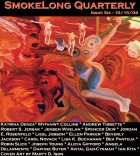Where does the name Singa come from?
Singa’s a made up name which just came to me the second I started to write the story. I just knew that was the name of the woman whose story was about to unfold. I love the sound and rhythm of the name. It could be an (eastern) Indian name; perhaps it is. I picture Singa with black hair and warm, light brown skin. Perhaps she was born in Kashmir. By now, her hair is probably silver.
Is naming characters a major part of your writing process?
Not at all. The “right” names just seem to fall into my lap, bequeathed by the characters themselves. My prose frequently tends to be character-driven. I don’t have a driver’s license, so I end up in the back seat. The stories of my characters always serve as vehicles to express what is important and meaningful to me.
You’ve published quite a bit over a fairly short period of time recently. Any recommendations to writers just starting out?
The online Zoetrope workshop experience has been invaluable. I also attended a week-long writers’ peer workshop/conference during the summer of 2003, which gave me confidence in my ability to write – my writer’s block dissolved. The other writers in my workshop were college-level creative writing teachers; I learned a lot from them. I should also mention that I was sporatically active in another online workshop at www.eastoftheweb.com before I became active in Zoetrope’s this past May.
Not only has the Zoetrope experience encouraged me to return to writing and helped me mature as a re-emerging writer, but the community serves as a rich resource for writers with questions about where they should submit their works. For instance, if I write an experimental, surreal, “existential” piece, I’ll want to know what publications might be likely to take it. I simply have to ask my colleagues the question. Most of the writers at Zoe are more than happy to share experiences and advice. Many of them have been publishing for years, so they have a lot of useful information to impart.
How did teaching English impact your writing style?
I taught remedial English and then English as a Second Language, both college level, so many years ago. I don’t think teaching influenced my writing styleS at all. What did have impact? I was brought up by academic parents who constantly corrected my grammar and encouraged my artistic expression (visual, musical, and written). I was an only child with a rich imagination; my imagination is unfettered at the best of times. I frequently feel like a Sybil, an instrument of unconscious forces when I write; I always have. I write to discover what I am thinking and feeling, what I believe in, who I am. I delight and amaze myself, and I rage against the dark forces within all of us, and the conformity that sickens me. Then, of course, I revise and revise and revise.
I think that years of lawyering, advocating for the underdog, have also influenced the way I write. I wrote a countless number of memoranda and briefs that required heavy duty analytical thinking processes at odds with my natural creative processes. I don’t know how lawyering has influenced my writing, but I suspect that it has.
What are some of the advantages of living in New York?
That’s a difficult question for me to answer, as I’ve been dying to leave this city for years to live surrounded by shades of green and blue. It’s much too noisy here, and it’s been scary since September 11th. I could see the Towers aflame from my apartment, and I smelled death for months after that.
Of course, there’s the plethora of enticing cultural candy shops and restaurants, colorful neighborhoods, promenades along the Hudson, the excitement of so much crazy life going on outside my windows, so many characters and stories that enter my unconscious and become part of me. There are always so many people to wonder about wherever one goes, each with her or his own fears and hopes, burdens and (I hope) joys, people from all over the world, with different assumptions and expectations; it’s fascinating.
If Bush-Cheney and their evil gang of thieves and murderers are re-selected, I’m going to have to hightail it out of this country before it becomes a total abomination on the landscape of this planet. I feel we’re already living in a surreal horror show. When I’m not going through an introverted phase, I’m an activist. Anyway, I’ve been seriously considering emigrating to New Zealand. Western Canada is number two.
You’ve published a book of poetry as well. What is your preferred form?
I published a chapbook of poetry years ago, Living Alone Without a Dictionary, but I was also publishing stories and hybrids. On occasion, I’ve been told I should convert a hybrid prose piece into a poem. I really feel more comfortable with prose these days, but my best prose tends to be lyrical, full of word and rhythm play. The best pieces do, in fact, resemble poetry, or at least, poetry I like, like early W.S. Merwin’s. Much contemporary poetry resembles un-lyrical prose, to my ears, and it’s boring as hell. But what are these labels about, anyway? I intend to write plays… after I’ve finished The Novel I’m supposed to be writing.



 The core workshop of SmokeLong Fitness is all in writing, so you can take part from anywhere at anytime. We are excited about creating a supportive, consistent and structured environment for flash writers to work on their craft in a community. We are thrilled and proud to say that our workshop participants have won, placed, or been listed in every major flash competition. Community works.
The core workshop of SmokeLong Fitness is all in writing, so you can take part from anywhere at anytime. We are excited about creating a supportive, consistent and structured environment for flash writers to work on their craft in a community. We are thrilled and proud to say that our workshop participants have won, placed, or been listed in every major flash competition. Community works.